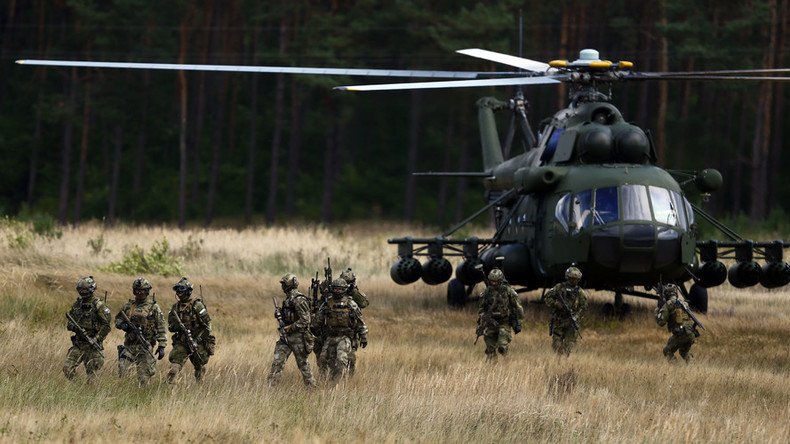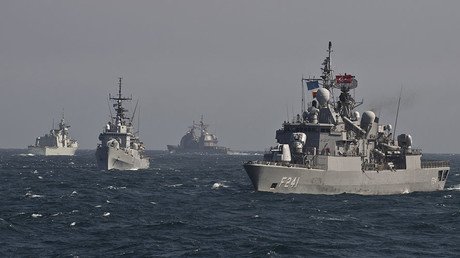Valdai 2016: NATO is biggest barrier to improved relations between Russia & West

Russian officials consider NATO to be obsolete. Yet, instead of drawing down, America is actually reinforcing its military presence in Europe. The bloc’s continued existence is now the biggest impediment to improved East-West relations.
If I had a dollar for every time I’ve experienced the following scenario in Russia, I’d have the price of a very fine suit or two. It goes like this: a Russian person, spotting that I'm foreign, winds up for a rant about “the west” and its attitude to their country. And just as the initial grievances are uttered, I then interrupt them mid-flow, take a deep breath and explain, “Ireland is not a member of NATO.”
Not only is it true, it always works a charm. However, it also reveals the main reason for Russia’s growing estrangement from the European Union and North America: a deep unease here about America’s intentions on the eastern side of the continent. Because Russians don’t see NATO as an alliance, they see it as an American-controlled club designed to project Washington’s power and serve its interests.
'Russia may lose patience over Syria accusations' - Putin https://t.co/9018gt26YZpic.twitter.com/BHuPAOQIwx
— RT (@RT_com) October 27, 2016
“What the general public in the western countries doesn’t understand is this: Russia has a long history of wars and has suffered hugely from them. And every modern invasion of our country has come from our western border. So when we see the Americans coming ever closer to that frontier, it makes us suspicious, even paranoid,” a high ranking Kremlin official told me this week.
“Then there’s this nonsense about how the west supposedly tried to integrate Russia into the ‘liberal world order’ and their institutions. Sure, they took us into the G8 and the World Trade Organization, but at the same time they were expanding NATO relentlessly and trying to push their influence even further up to our borders in Ukraine and Georgia," he continued. "And NATO is an anti-Russia organization. If our country disappeared tomorrow, so would NATO. Everyone knows that.”
The functionary was speaking on the fringes of the annual Valdai Discussion Club in Sochi’s Krasnaya Polyana district — a gathering where the entire premise hinges on agreed anonymity, which, while partially frustrating for a journalist, does facilitate the loosening of tongues. Far from the already snowy Moscow, guests basked in warm temperatures at the subtropical resort. They included China’s Foreign Affairs' Chairperson Fu Ying, former South African President Thabo Mbeki, and Russian President Vladimir Putin.
A New World Order?
In his address, the Russian President once again called for an end to the US-dominated world order, and outlined some of the Kremlin’s current foreign policy positions. Pouring scorn on the current hysteria in America about alleged Russian interference in the ongoing general election campaign, he remarked: “Is America some kind of Banana Republic? America is a great power... does anyone really think that Russia can affect the choice of the American people?”
Pointing out that the West wanted globalization for its own purposes, Putin called for it to be used for the benefit of the many, not the few. But it was when the subject turned to NATO that Putin really let rip. He insisted again that Russia has no intention of attacking anyone, and asserted how it’s “a myth” that his country poses a military threat to the bloc’s members.
Does not promote stability - #Russia on #US Marines deployment in #Norwayhttps://t.co/Otlmh4VDLTpic.twitter.com/GRAPP0Y9Ga
— RT (@RT_com) October 28, 2016
All this fits neatly with what a foreign ministry bureaucrat told me later that evening. “Our government has just announced plans to cut armed forces spending by 12 percent. Now, if there was ever a sign that we were trying to de-escalate tensions, this is it! But how have the Americans responded? By moving soldiers into Norway to try and provoke us,” he explained.
READ MORE: Dress warm, pack condoms, hide: Lithuania writes guerilla manual for Russian invasion
The usual Washington justification for its aggressive posturing is how these European countries willingly joined their organization. The diplomat laughed at this. “Get it straight. Who would not want the richest country in the world paying for their security? Militaries are expensive, to both equip and maintain,” he pointed out. “If the Americans are willing to send a few hundred troops to your soil, it saves you a few hundred salaries.”
But how does America gain? “Their strategy is based on overwhelming dominance (of the world). So to achieve this, they feel the need to literally sign up countries into their sphere of influence,” he elaborated. “Also, it benefits certain sectors of their economy. At a time when they have experienced a massive flight of industry, which Donald Trump is exploiting, weapons spending is keeping factories alive and blue collar jobs viable in a great many — otherwise depressed — parts of the US.”
“The Americans also keep to this messaging about how NATO is a defensive alliance. If that is the case, why is Latvia, for instance, a member? Or why did they support Georgia joining up? Does signing a blanket guarantee to protect these countries improve America’s defenses in any way?” the official asked. “Of course not. And this means NATO is actually an offensive vehicle, designed to encircle and “contain” Russia – which has been an American tactic since the days of George Kennan.”
Gloomy Predictions
The general feeling amongst the Russian expert community on Valdai’s fringe was that any prospect of Moscow-Washington rapprochement under American leadership (as was practiced in the 1990’s) is a nonstarter. And there were warnings that the Kremlin may become increasingly hardline until the US government understands this. As a result, there were whispers that Russia may soon formally withdraw from the 1997 NATO-Russia Founding Act, which many power brokers here feel the bloc has already breached.
Recently, the respected Russian analyst Dmitry Trenin suggested that Putin’s agenda is undoing the post-Cold War situation in which America does at it pleases, forms “coalitions of the willing,” organizes “regime change” expeditions, and essentially attacks whomever it wants. That tallies with Putin’s statements at Valdai and the views of most of the influential Russians around the event.
Russia isn’t trying to overhaul the world order — it’s trying to restrain America’s unilateral foreign policy and replace it with a rules-based system where all the world’s major players have some kind of influence, the argument goes. And the first step on that road has been Moscow’s refusal to countenance further NATO expansion into Ukraine and Georgia.
“If it really wanted, the next administration in Washington could heal the entire rift between our countries with a few sentences. All the new president has to say is that there will be no more NATO expansion eastwards and no armed brigades near our borders. I am sure we would respond in kind by demilitarizing Kaliningrad and other border zones,” mused the Kremlin official. “Really, that’s all it would take. And then we could all forget this wasteful tension and work together to solve the real problems in the world.”
It was apparent in Sochi that Russians believe NATO is the biggest single barrier to improved relations between Russia and the West – which proves the oft-made point that NATO exists to counter threats that exist because it exists in the first place.
The statements, views and opinions expressed in this column are solely those of the author and do not necessarily represent those of RT.














